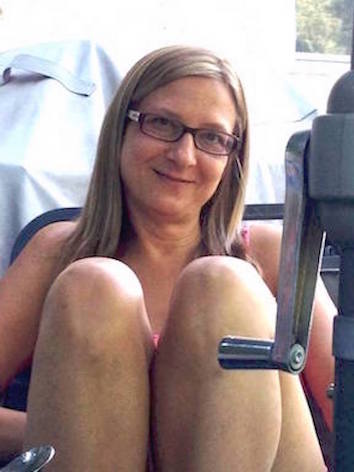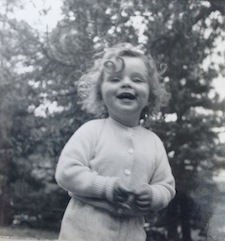Joanne, dear Joanne. We miss you so much. It’s almost been four weeks now since you left us, and I want to tell others what I told those who came out to St. Albert to mourn your moving on. I feel the injustice on your behalf all over again—we have each other for our grief, but you agonized privately, stoically, courageously, and graciously over yours. We know how badly you still wanted to be here.
It was a beautiful service. I’m pretty sure you would’ve liked it a lot. Lindsey and John did a wonderful job of choosing the photos and music and words that told your story. Even played Neil Young singing “Somewhere on a desert highway, she rides a Harley-Davidson, her long blonde hair flyin’ in the wind,” and somewhere between the beginning and the end of it I soaked every tissue in my bag. You were—always and at every stage of your life right up to the end—beautiful. 
But I think you know it was a nice service. You weren’t there of course, not there in the way we wanted you there, smiling and hugging and talking and all those good things, but you were there. I had an image of you so comfortable again now, and happy, perhaps even dancing in the ether somehow as you looked on.
I have a plane to catch today, and woke up super early—5:30—in part because I wanted to have a chat with you. You’d understand, even though you were always more likely to be awake into the early morning hours than wake up then. You knew insomnia, and you knew the feeling of having run a marathon when it was actually only walking the tiniest fraction of one that created the conditions for an early morning hour leg cramp.
I went shopping for a dress yesterday, and I missed you. I had to take advice from the sales associates, who, while great, weren’t you. You would’ve been proud of me though—I walked the entire length of the mall and back—West Edmonton Mall, no less—and paid for it with only the one little leg cramp.
You always were a better shopper than I was. Less impulsive and far more discriminating. And generous. Last year, when for a while I couldn’t walk more than the distance of a very short city block, you not only quickly became the expert on which shopping malls had the best wheelchairs, you also got to work sharpening my fashion sense. I’d be looking at a floral dress or some oversize casual comfort thing, and you’d raise your her eyebrows just a little as if to ask “you’d wear that?” and then go on to suggest something a little edgier and talk me into it. Had we been a little stronger, you might’ve tried to talk me into a Harley and some chaps.
You did this wheelchair thing for me even though on some of those occasions you struggled to find enough strength yourself. It was the blind leading the blind, though we were anything but blind.
You were a constant, loyal, brilliant, quiet, strong and lovely light in our lives. I didn’t know you for as long as some of your friends, but I feel so, so lucky to have known you at all, because it was always and only a joy, an honour, a privilege.
It was four years ago we met, almost exactly, remember? With a Facebook chat, at Michele’s suggestion. It was the loveliest of gifts she gave me, introducing me to you. That first coffee, which lasted two or three hours, bonded us—in part over the shorthand cancer survivors know, but also simply because there was so much more there between us to bond over.
We’d been worried about meeting, we discovered. You worried you might become locked in with someone a little crazy, which, it turns out, was perhaps a legitimate concern. Both of us worried a little about wading in with another cancer survivor, afraid of the potential loss there. But coffee visits quickly became lunches at the Tea Place, and eventually anything, anytime, with or without our husbands. Sometimes one or the other of us would be too sick to make it for a week or two, and those were hard. We worried about each other, and felt bad when we were unable to help and be there.
I knew from the start that you were way cooler than I’d ever be, with your quiet, sharp dry sense of humour. And I knew you’d be a rare kind of friend, the kind where affection grows quickly and profusely and becomes deeply rooted.
I quickly saw your wonderful capacity as a mom to Lindsey, your deep, happy, proud love for her, and your deep, deep love for John too. I saw that you understood my husband’s humour—which is never a given and really an essential ability in my friends—and I quickly learned that you were his match that way, that you knew how to deliver irony as quickly and expertly as anyone.
You were determined and generous, always ready to help, to bring food, to listen, to find things to share a laugh about. You made it to my birthday party the summer you were trying to survive the beating radiation delivers. And you made it to the-grandkids-are-in-town party last fall too, when your health problems were really starting to snowball. Loyal and kind and quick to put the needs of others ahead of your own—that was you.
Your successes in the face of the odds stacked against you speak to your determination and intelligence. There was nothing you wouldn’t research and be willing to sacrifice to be healthier, stronger, and fighting for your life. You defied those awful odds they gave you for a nice long time, and you did it on your terms, maintaining an amazing quality of life for a good long part of that. But cancer is a still a determined and nasty thief.
Both of us convalescing off and on for much of the past few years, we often swapped Netflix entertainment ideas, and I soon learned that underneath your competent and contained social worker and biker persona lay the most tender-hearted human being. Almost embarrassed to admit I wept my way through endless seasons of Call the Midwife I was comforted to learn that you had wept your way through them as well.
Always, your top priority was Lindsey—you wanted her to have all the parental support she needed to get a post secondary education, to have a place to land, a home. And near the end, you determined Lindsey would finish her term, cancer or no—and you succeeded in hanging on to facilitate exactly that.
Recently, when it became apparent just how grave things had become, I felt crushing sorrow. Still we hoped. And nearly right up to the end, you’d make us smile when we’d visit, reminding us that we weren’t to be taken too seriously because we’re crazy.
Lovely, lovely Joanne. You’ve left an enormous hole in our lives. Our hearts are broken, but we will, as you and Lindsey have so beautifully engraved into your skin, carry you there forever.


